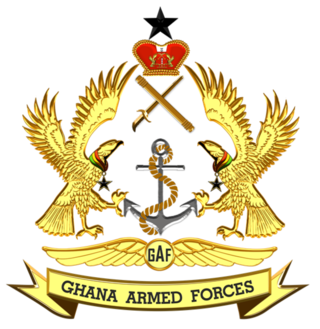
Kotoka International Airport is an international airport in Accra, the capital of Ghana. The airport is operated by Ghana Airports Company Limited (GACL), which has its offices on the airport property. It is the sole international airport in Ghana.

The Ghana Air Force (GHF) is the aerial warfare organizational military branch of the Ghanaian Armed Forces (GAF). The GHF, along with the Ghanaian army (GA) and Ghanaian navy (GN), make up the Ghanaian Armed Forces (GAF), which are controlled by the Ghanaian Ministry of Defence (MoD).

Joseph Arthur Ankrah was a Ghanaian army general who was head of state of Ghana from 1966 to 1969 as Chairman of the National Liberation Council. He was Ghana's first military head of state. Ankrah also served as Chairperson of the Organisation of African Unity from 24 February 1966 to 5 November 1966. Previously, Ankrah was appointed the first commander of the Ghana Army in 1961.
Lieutenant General Akwasi Amankwaa Afrifa was a Ghanaian soldier, farmer, traditional ruler and politician. He was the head of state of Ghana and leader of the military government in 1969 and then chairman of the Presidential Commission between 1969 and 1970. He continued as a farmer and political activist. He was elected a member of Parliament in 1979, but he was executed before he could take his seat. He was executed together with two other former heads of state, General Kutu Acheampong and General Fred Akuffo, and five other generals, in June 1979. He was also popularly referred to by his title Okatakyie Akwasi Amankwaa Afrifa and was in addition the abakomahene of Krobo in the Asante-Mampong Traditional Area of the Ashanti Region of Ghana.

Lieutenant-General Emmanuel Kwasi Kotoka Born was a Ghanaian military officer who was a member of the ruling National Liberation Council which came to power in Ghana in a military coup d'état on 24 February 1966. This overthrew the government of Dr. Kwame Nkrumah, the first president of the republic.

The National Liberation Council (NLC) led the Ghanaian government from 24 February 1966 to 1 October 1969. The body emerged from a coup d'état against the Nkrumah government carried out jointly by the Ghana Police Service and Ghana Armed Forces with collaboration from the Ghana Civil Service.

The Supreme Military Council (SMC) was the ruling government of Ghana from 9 October 1975 to 4 June 1979. Its chairman was Colonel I.K. Acheampong. He was also the Head of state of Ghana due to his chairmanship.
Lieutenant General Albert Kwesi Ocran was a soldier and politician. He was a member of the Presidential Commission of Ghana between 1969 and 1970. He is a former Chief of the Defence Staff of the Ghana Armed Forces and was a member of the National Liberation Council (NLC) military government in Ghana.

From 1966 to 1979, the nation of Ghana underwent a turbulent era as the Second Republic of Ghana. It began when the government of Kwame Nkrumah was overthrown on February 24, 1966 by a military coup.

Otumfuo Opoku Ware II was the 15th Asantehene. He succeeded his uncle Osei Tutu Agyeman Prempeh II on 27 July 1970. He ruled for 29 years until his death in February 1999. He was succeeded by Otumfuo Nana Osei Tutu II.
Kwame Sanaa-Poku Jantuah, originally known as John Ernest Jantuah, was a Ghanaian politician, lawyer and diplomat.
Anthony K. Deku was a politician and a member of the Council of State of Ghana. He served as a former Presidential Aide to Ghana’s first President; Osagyefo Dr. Kwame Nkrumah, Commissioner of Police in Ghana and an Astute Politician and Statesman.
Reginald Reynolds Amponsah was a Ghanaian potter and politician of the first Parliament of the Second Republic representing the Mampong North constituency in the Ashanti region of Ghana. He was a Minister of State in the Busia government.
1970s in Ghana details events of note that happened in Ghana in the years 1970 to 1979.
Kofi Badu was a Ghanaian politician and journalist. He served as a member of parliament during Ghana's first republic and a minister of state during the Supreme Military Council (SMC) era and the Armed Forces Revolutionary Council (AFRC) era. As a journalist, he was editor for various newspapers.
Kojo Tsikata was a Ghanaian military officer and politician, who served as the Head of National Security and Foreign Affairs of the Provisional National Defence Council (PNDC). He was listed as a retired army captain in the Ghana Army.
Ashtown Ladies Football Club is a Ghanaian professional women's football club based in the heart Ashtown in Kumasi in the Ashanti Region of Ghana. The club is founded on the principles of inclusivity, empowerment, and excellence and strive to create an environment where female athletes of all ages and backgrounds can develop their skills, build lasting friendships, and become positive role models in our community.
Victor Coker-Appiah is a Ghanaian soldier and politician. He served in various capacities in the National Redemption Council (NRC) military government led by Colonel I. K. Acheampong which overthrew the civilian elected government led by Kofi Abrefa Busia.






